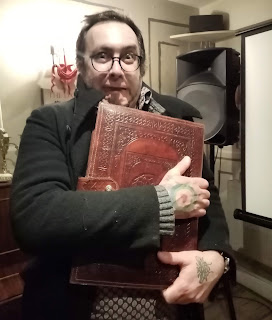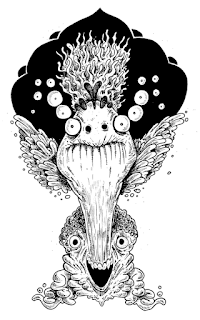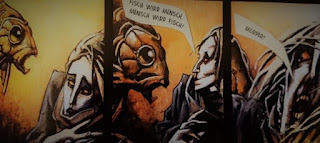 |
| Your author and the Book of Horkos |
I wrote recently here about real-world magic. Bear with me skeptics (feel free to call it something more sciency if you prefer: perhaps "psychology" or "human nature" or "nudge theory"), for here is another powerful school of magic in the real world: the spell that is cast by the perilous oath.
Some years ago, Daisy Eris Campbell came up with the idea of the Book of Horkos. Horkos was an ancient Greek demigod responsible for punishing oath-breakers. Horkos was (is?) the son of Eris, goddess of chaos - and so it's appropriate that her namesake should have birthed this book. The Book is a huge leather-bound tome in which, every six months, on Horkos Day (23rd January and 23rd July), pledgers - or Horkosians, as we call ourselves - write down their intentions for the next six months.
(Incidentally, flip the book over and open it from the other side and you'll find that it originated as the memorial book from the funeral of Daisy's dad Ken Campbell. Which makes it all the more astounding when you discover what we may one day have to do with it...)
It's all very well to make a pledge but we can, and do, break promises all the time. Modern times lack a Horkos to impose the most severe of punishments on those who go back on their word. But in his book, we hold his spirit sacred, and the retribution for breaking any pledge within it is terrifying.
Six months after pledges have been made, if any one person who wrote in the book has failed to do what they promised, the book must be burnt and all those within suffer the punishment of Horkos. An early version of the book did meet this fate, but the current incarnation has been going strong for some six years and over 100 pledges. This is helped, no doubt, by the fact that all of those pledging need to agree to each and every pledge, resulting in the emergence of "Horkosian lawyers", who study very carefully the pledges made, and negotiate the wording to keep each promise specific and achievable.
Creative people are notoriously flaky. We change our minds, suffer fits of doubt, fail to get out of bed in the morning... we excel in finding excuses to do anything rather than do the work. The Book of Horkos is a solution to that problem. Do the work... or something cosmically terrible will happen. You'll not just be letting yourself down, you'll be letting your fellow Horkosians down. Hell, you'll be letting the universe down.
And it's been incredibly effective, Not one failed pledge out of the many made so far. Artworks have been birthed: books, plays, paintings, music and games; new skills learnt, new businesses launched, new life paths undertaken. Mrs Death Misses Death, the astounding and bestselling novel by Salena Godden, started life as a Horkos pledge.
I have completed four pledges myself in the past: to write twelve short stories; learn to sing and play the guitar at the same time; write a D&D adventure; and commit to heart the first of TS Eliot's Four Quartets, Burnt Norton.
Last night, I made my 5th pledge, and here it is:
I, Dan Sumption, shall write an alliterative poem "King Arthur vs Devil Kitteh" based upon the story in the Prose Merlin. The poem shall tell of
- How Merlin and Arthur travelled to the Alps
- How a ferocious cat ended up living in the Alps
- How Arthur battled and slew the cat
The power of Horkos is such that this morning I leapt out of bed at 4:30am and knocked together a first draft of the middle part of the tale, "how a ferocious cat ended up living in the Alps". Here it is:
Sometime ago a fisher came to fish the lake
Which lies beyond Lausanne in lofty Alpine lands.
Before he cast his kit and clobber, first he prayed;
Communed with christ and promised him the first fish caught
Quite soon he caught his first fat fish, my it was big!
It's worth was 30 shillings, so he said "OK
The Lord can wait a little while, he'll have the next."
But when the next was netted it was larger still
"God will abide" he said "the third he'll have for sure",
And cast his net once more, and once more reeled it in.
He had to heave and haul for it was heavier still,
But there inside, instead of fish, he'd caught a cat
A king sized kitten came out of the net and cried,
A mighty mewl that made the mountains boom and quake.
At this the fisher soon forgot the vow he'd sworn
And said "this kitteh could soon rid my house and home
From mice and rats that have beset my family,
And forced them to feed frugally and miss their meals."
But once the kitten came inside his house it turned
And killed his wife and children and consumed them whole,
Then sauntered off into the mountains past the lake.
From then until this time the kitten terrorised
And ruled the region, driving everybody out,
Or killing those who were too slow to steal away.
So, we should ride and rid the region of this threat
For t'would be knightly. Plus, it's on our route to Rome.
The completed poem, "King Arthur vs. Devil Kitteh", will be published later this year as an illustrated book, subject to a successful crowdfunder.
The Book of Horkos is special. But it's not special. Anyone can create a similar ritual for themselves. Just follow the rules above, or adapt to your own circumstances. But be sure to keep it perilous!



